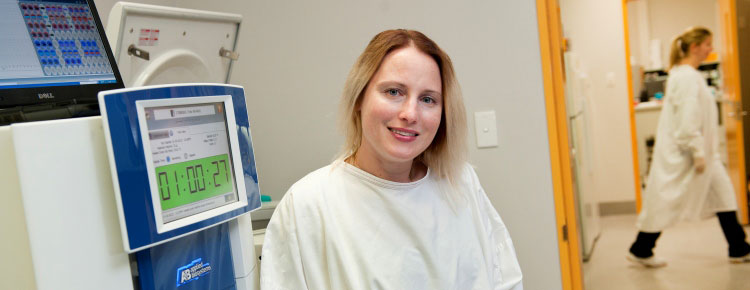Researcher Highlights
Cancer crusader
Dr Kelly Avery-Kiejda
Dr Kelly Avery-Kiejda hopes to improve diagnosis and treatment for breast cancer sufferers by identifying new biomarkers for the disease.

A protein known as 'the guardian of the genome' has been a source of scientific fascination to molecular biologist Dr Kelly Avery-Kiejda for the past seven years. The P53 protein is so named for its ability to prevent the propagation of mutations that can lead to cancer.
P53 is a tumour suppressor, which can put the brakes on cancer by inhibiting the division of cells with DNA damage. But the protein is deactivated in many types of cancers, neutralising this powerful protection against the disease. Avery-Kiejda's research is focused on gaining a better understanding of the function of the protein and the factors that influence its activation.
Avery-Kiejda's first postdoctoral project in 2005 involved the investigation of isoforms (variants) of P53 and their links to chemotherapy resistance in melanoma. She is now applying that expertise to breast cancer research, looking specifically at the role the protein plays in the progression of advanced cancer, with the aim of developing a better method of diagnosing a cancer's potential to develop metastases.
"P53 isoforms were only discovered in 2005 and there is very little known about their role in breast cancer. We are one of the few groups studying that and, to my knowledge, unique in our emphasis on their role in promoting metastatic disease," Avery-Kiejda points out. "Breast cancer, or any cancer, essentially becomes incurable once a secondary cancer develops, so if we can identify markers that will indicate at an early stage whether a patient is more likely to develop a metastasis, then we can treat that patient differently from the outset."
In a related line of research, Avery-Kiejda is pursuing a project that could expand treatment options for women diagnosed with triple-negative forms of breast cancer, which are resistant to most conventional forms of hormone therapy. Since 2009, she has been a key researcher on a multi-site project funded by the National Breast Cancer Foundation (NBCF) analysing the expression of microRNAs. These small molecules are known to play a role in some cancers and can be used as a prognostic tool. In a novel finding, her team has identified a subset of 27 microRNAs that appear to be irregular in breast cancer patients who have developed lymph node metastases.
"This is a critical and very exciting finding because it means we may be able to use this information either to develop a treatment target or to diagnose secondary cancers earlier," Avery-Kiejda explains. "We have been looking at this specifically in triple-negative breast cancers but it may be applicable to others as well."
Avery-Kiejda's research has attracted the support of key cancer organisations, including Cure Cancer Australia, Cancer Australia and the Melanoma Institute Australia. Her affiliation with the University of Newcastle and the Hunter Medical Research Institute (HMRI) has opened collaborations with influential researchers such as the Australia and New Zealand Breast Cancer Trials Group research director Professor John Forbes and internationally recognised cancer geneticist Professor Rodney Scott.
"Everyone, myself included, knows someone who has been affected by cancer," she notes. "It has always been my dream to do something that will make a difference to patients by contributing to more effective treatment strategies."
Visit the Centre for Cancer
Visit the HMRI website
The University of Newcastle acknowledges the traditional custodians of the lands within our footprint areas: Awabakal, Darkinjung, Biripai, Worimi, Wonnarua, and Eora Nations. We also pay respect to the wisdom of our Elders past and present.
